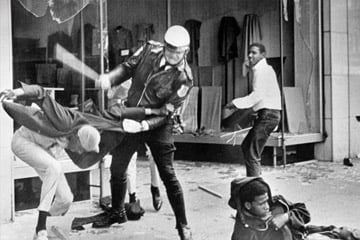Power, Politics, & Pride: 1968 Riots
Power, Politics, & Pride: 1968 Riots
On April 4, 1968, Dr. Martin Luther King was assassinated in Memphis, TN. As the news of his murder spread, black urban centers across the country erupted in violence and rage. Rioters, looters, and arsonists rampaged through communities, laying waste to homes and businesses.

The West Side of Chicago was hit hard. Businesses were devastated as looters smashed windows, destroyed property, and brazenly made off with armloads of merchandise. People ran in fear as snipers shot off rounds. Rioters blocked streets, keeping emergency personnel from responding to calls for help. Thirty-six major fires burned freely as the city's overwhelmed fire department struggled to keep up amidst the chaos. By April 7, 11 people were dead, more than 500 were injured, and 3,000 had been arrested.
Mayor Richard J. Daley responded to the crisis by imposing a curfew on anyone under the age of 21 and closing off affected streets. The sale of liquor, guns, ammunition, and flammable materials was banned in the areas of conflict. Scores of Illinois National Guards were sent to the West Side and President Lyndon Johnson directed 5,000 troops into the city to reinforce the Chicago's outnumbered police force. Army personnel ordered the use of tear gas against mobs. But after a helicopter survey, which gave Daley a clear view of the vast destruction on the West Side, he called for the use of deadly force.
I have conferred with the superintendent of police this morning and gave him the following instructions: I said to him very emphatically and very definitely that an order be issued by him immediately and under his signature to shoot to kill any arsonist or anyone with a Molotov cocktail in his hand because they are potential murderers, and issue a police order to shoot to maim or cripple anyone looting any stores in our city. Above all, the crime of arson is to me the most hideous and worst crime of any and should be dealt with in this fashion. (FC)
Daley later said that his directive had been misunderstood. The events of riots would not only leave a scar on Daley's mayoral legacy, but have a profound effect on the West Side. More than 40 years after King's assassination, some neighborhoods in the area are still struggling to rebuild.


